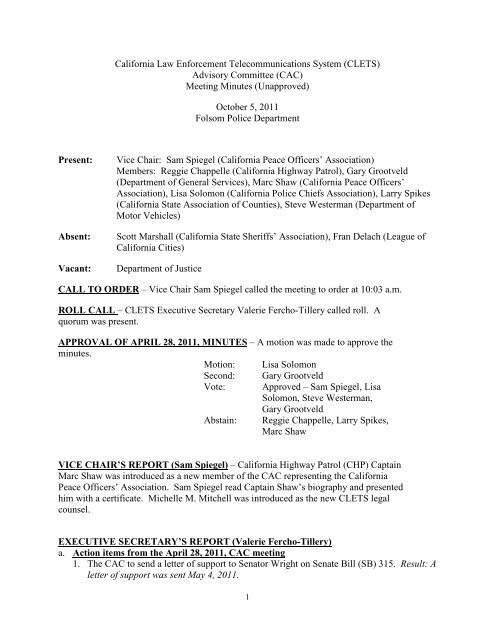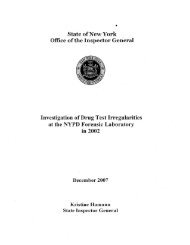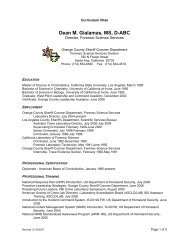CLETS CAC Meeting Minutes 021512 - Attorney General
CLETS CAC Meeting Minutes 021512 - Attorney General
CLETS CAC Meeting Minutes 021512 - Attorney General
Create successful ePaper yourself
Turn your PDF publications into a flip-book with our unique Google optimized e-Paper software.
California Law Enforcement Telecommunications System (<strong>CLETS</strong>)<br />
Advisory Committee (<strong>CAC</strong>)<br />
<strong>Meeting</strong> <strong>Minutes</strong> (Unapproved)<br />
October 5, 2011<br />
Folsom Police Department<br />
Present: Vice Chair: Sam Spiegel (California Peace Officers’ Association)<br />
Members: Reggie Chappelle (California Highway Patrol), Gary Grootveld<br />
(Department of <strong>General</strong> Services), Marc Shaw (California Peace Officers’<br />
Association), Lisa Solomon (California Police Chiefs Association), Larry Spikes<br />
(California State Association of Counties), Steve Westerman (Department of<br />
Motor Vehicles)<br />
Absent: Scott Marshall (California State Sheriffs’ Association), Fran Delach (League of<br />
California Cities)<br />
Vacant: Department of Justice<br />
CALL TO ORDER – Vice Chair Sam Spiegel called the meeting to order at 10:03 a.m.<br />
ROLL CALL – <strong>CLETS</strong> Executive Secretary Valerie Fercho-Tillery called roll. A<br />
quorum was present.<br />
APPROVAL OF APRIL 28, 2011, MINUTES – A motion was made to approve the<br />
minutes.<br />
Motion: Lisa Solomon<br />
Second: Gary Grootveld<br />
Vote: Approved – Sam Spiegel, Lisa<br />
Solomon, Steve Westerman,<br />
Gary Grootveld<br />
Abstain: Reggie Chappelle, Larry Spikes,<br />
Marc Shaw<br />
VICE CHAIR’S REPORT (Sam Spiegel) – California Highway Patrol (CHP) Captain<br />
Marc Shaw was introduced as a new member of the <strong>CAC</strong> representing the California<br />
Peace Officers’ Association. Sam Spiegel read Captain Shaw’s biography and presented<br />
him with a certificate. Michelle M. Mitchell was introduced as the new <strong>CLETS</strong> legal<br />
counsel.<br />
EXECUTIVE SECRETARY’S REPORT (Valerie Fercho-Tillery)<br />
a. Action items from the April 28, 2011, <strong>CAC</strong> meeting<br />
1. The <strong>CAC</strong> to send a letter of support to Senator Wright on Senate Bill (SB) 315. Result: A<br />
letter of support was sent May 4, 2011.<br />
1
2. The <strong>CAC</strong> to send a letter to the Los Angeles County Sheriff’s Department (LASD) reminding<br />
the agency of the requirement to appear in person when requesting an extension. Result: A<br />
letter was sent to the LASD on May 23, 2011. A response was received without the requested<br />
information on August 16, 2011. A follow-up letter was sent to the LASD on August 29,<br />
2011. LASD responded on September 19, 2011 with the requested information.<br />
3. Scott Marshall to contact the Contra Costa County Sheriff to reinforce the requirement the<br />
agency send a representative to the next <strong>CAC</strong> meeting, if not compliant. Result: The Contra<br />
Costa County Sheriff became compliant in early June 2011.<br />
b. <strong>CLETS</strong> System Misuse Statistics<br />
Possible cases of <strong>CLETS</strong> misuse worked by the Department of Justice (DOJ) from April 1,<br />
2011, through September 30, 2011:<br />
Of the 63 cases reported:<br />
33 cases are pending<br />
30 cases were closed<br />
1 case of misuse was verified<br />
Source of misuse complaints<br />
43 Law enforcement<br />
6 Federal<br />
3 Private citizen<br />
7 Criminal justice<br />
4 DOJ<br />
c. <strong>CLETS</strong> Traffic Statistics (April 2011 through June 2011)<br />
Inbound Outbound<br />
Total messages 223,758,958 224,890,229<br />
Monthly average 74,586,326 74,963,409<br />
Peak day 2,868,727 2,887,188<br />
Peak hour 195,109 196,561<br />
<strong>CLETS</strong> Traffic Statistics (July 2011 through September 2011)<br />
Inbound Outbound<br />
Total messages 225,498,537 226,920,586<br />
Monthly average 75,166,179 75,640,195<br />
Peak day 2,790,204 2,992,197<br />
Peak hour 200,218 266,720<br />
d. Legislative Report<br />
1. Assembly Bill 13 – This bill would add charter schools to the existing law that authorizes<br />
a school district or county office of education to request that a local law enforcement<br />
agency conduct an automated criminal history records check of a prospective<br />
nonteaching volunteer aide. This bill failed to pass the Senate Education Committee.<br />
2. Senate Bill 315 – This bill mandates that a prescription be required for any over-thecounter<br />
medication containing an ephedrine-based drug. The <strong>CAC</strong> sent a letter of<br />
support to Senator Wright. This bill is parked in the health committee and will be taken<br />
up next session. A hearing is scheduled January 11, 2012.<br />
2
3. Assembly Bill 109 – Lisa Solomon brought up for discussion Assembly Bill 109 and the<br />
many changes occurring in how information is shared with local law enforcement<br />
agencies for the post-community supervision releases that will happen through the local<br />
agencies instead of through paroles. Paroles is planning on uploading information into<br />
DOJ’s Supervised Release File (SRF), but local probation departments need to update<br />
that information so that law enforcement agencies can have continuity on information<br />
sharing on these individuals after they have left the state’s hands. There are<br />
conversations among other committees, including the statewide data sharing task force<br />
and another committee that is discussing exactly how data sharing will occur at the state<br />
level, between the DOJ and other partners in the state.<br />
Bureau of Criminal Information and Analysis Chief Julie Basco spoke about the DOJ’s<br />
realignment, saying the tight time frame made enhancement impossible. Thus, the DOJ<br />
looked at its existing databases to determine which types of existing message keys and<br />
data methods could be utilized for this new group, with an emphasis on the SRF. The<br />
DOJ provided information to law enforcement, the courts and probation with guidelines<br />
on how to use the existing message keys to capture the post-community supervision<br />
release population, as well as the community supervision population. Though not ideal,<br />
that was all possible with existing message keys. Presently, there is no indicator for this<br />
new group, but the DOJ is working on a message key enhancement that ideally will be<br />
launched in December, allowing an individual’s status to be much more prominent in the<br />
reply that is returned. The DOJ also looked at its criminal offense table, which guides<br />
the Live Scan device choices. For example, if an individual normally would have gone to<br />
CDCR and coming out of court instead is sentenced to county jail, that jail will have the<br />
option of fingerprinting the individual under a criminal type of transaction. Those<br />
fingerprints will record on the rap sheet and show as a local custody when individuals are<br />
taken into custody at a local jail, which currently does not happen routinely, though that<br />
option is available. The DOJ also updated its offense tables to cover its new disposition<br />
codes should someone come out of court with the Penal Code 1170h designation.<br />
HAWKINS DATA CENTER UPDATE<br />
a. Business Managers Alliance (BMA) Telecommunications Focus Groups (Amy<br />
Peters) – A pilot project has been ongoing for more than a year in an attempt to secure<br />
Mobile ID between two agencies, the Fresno-area CHP and the Fresno County Sheriff’s<br />
Office, using the DOJ law enforcement network. The involved agencies successfully<br />
conducted testing over the network. One remaining issue is the blue check devices that<br />
connect to the laptop for the local CHP officers. When that bug is resolved, a 30-day<br />
pilot will be run to determine the impact on the DOJ network, if any. Processes will be<br />
put in place so that traffic can be tracked and to ensure the system is manageable and<br />
responding as desired over the network.<br />
INFORMATION SHARING REPORT (Christina Rogers) – The DOJ’s Division of Law<br />
Enforcement (DLE) has been at the table of the task force chaired by <strong>CAC</strong> member Lisa<br />
Solomon and has been partnering with CalEMA in discussions about node administrators and<br />
looking at which type of data the DOJ can bring to the table that would add value to the <strong>CAC</strong><br />
3
work in terms of law enforcement activities. Sam Spiegel emphasized the need for proactive<br />
participation at the executive level. The goal of the task force, Sam Spiegel said, was to put a<br />
futures focus on the problem and start the communication among the stakeholders as soon as<br />
possible so that there is a concept once things begin rolling out. Such a tactic, he indicated,<br />
would be beneficial should legislation evolve regarding data sharing and the consequences of<br />
being unprepared. Christina Rogers emphasized that DLE Director Larry Wallace is quite<br />
interested in pushing the data sharing effort and has committed to making this happen, though<br />
how that commitment will be fulfilled is uncertain. Because the DLE faced many budget cuts,<br />
much of DLE’s organization was cut. By the next <strong>CAC</strong> meeting, the strategy may be clearer.<br />
PAWN LEGISLATION REPORT (Jessica Devencenzi) – Pawn brokers and secondhand<br />
dealers are required to fill out form JUS 123, which in turn must be given to local law<br />
enforcement and the DOJ. Local law enforcement should enter the form’s information into the<br />
Automated Property System (APS), enabling all local law enforcement to search for stolen<br />
goods. However, many jurisdictions cannot keep up with the high volume of forms coming into<br />
their offices, so the information often is not entered into the APS. Dialog ensued about how this<br />
information could be tracked. In 2000, legislation passed requiring the DOJ to meet with<br />
secondhand dealers and local law enforcement to solve the electronic transmission issue. There<br />
was little funding and the parties couldn’t agree on how an electronic format should appear. Ten<br />
years went by with little movement, but a 2010 senate resolution encouraged the DOJ to<br />
reconvene the previous meetings, which began in February 2011.<br />
A pawn broker secondhand dealer workgroup was begun, and the aforementioned parties<br />
resumed discussions. An agreement was reached on how secondhand dealers would<br />
electronically report (a schematic diagram was distributed). Thus, in lieu of JUS 123,<br />
pawnbrokers and secondhand dealers will enter their transactions into an online database,<br />
currently called the Pawn Hub, which will be developed by the DOJ. In turn, the DOJ will<br />
process those transactions into the APS, and that information will be available to all local law<br />
enforcement agencies. Those agencies will be able to search against or extract that information<br />
for entry into their local systems. Dealers will not be able to enter any data into <strong>CLETS</strong> through<br />
<strong>CLETS</strong> lines or directly into APS. Funding for this process will come from secondhand dealers’<br />
licensing fees. Legislation, with an urgency clause, will likely be introduced next session.<br />
Assuming the legislation passes, funds will begin to build up, the database would be developed<br />
and the process could begin in approximately 2014. The <strong>CAC</strong> asked for perennial updates. Lisa<br />
Solomon said it would be helpful if the upcoming database could be fed into other law<br />
enforcement databases, including Coplink.<br />
PROPOSED <strong>CLETS</strong> POLICIES, PRACTICES AND PROCEDURES (PPP) CHANGES<br />
(Valerie Fercho-Tillery) – The current PPP refers to specific sections in the Federal Bureau of<br />
Investigation’s (FBI) Criminal Justice Information Services (CJIS) Security Policy. When the<br />
PPPs were rewritten a couple of years ago, the users were adamant that references to the FBI’s<br />
CJIS Security Policy included the section number of that policy in the PPPs. That was done.<br />
Then early in 2011, the FBI revamped its CJIS Security Policy, changed all its section numbers<br />
and altered some of the terminology. The revision currently being proposed would update all of<br />
the PPP section numbers to match the FBI’s CJIS Security Policy and also change some<br />
4
terminology so that they stay in sync. No other changes in the PPPs were proposed at that time.<br />
A motion was made to accept the PPP changes as proposed.<br />
NEW SERVICE APPLICATIONS<br />
Motion: Gary Grootveld<br />
Second: Larry Spikes<br />
Vote: Approved unanimously<br />
There were four new service applications. Each application was voted on individually.<br />
a. Santa Clara County Social Services Agency, Welfare Fraud Investigation Unit<br />
(Dave Sutherland) – The unit was originally assigned to the Santa Clara County District<br />
<strong>Attorney</strong>’s Office, but was moved to a non-law enforcement agency, the Department of<br />
Social Services, necessitating an application for new service. The agency is now a law<br />
enforcement unit of a non-law enforcement agency, with more than 50 percent of its<br />
budget allocated toward law enforcement functions. The agency has peace officer status<br />
under California Penal Code 830.35. The agency will investigate suspected welfare and<br />
in-home services welfare fraud.<br />
Motion: Reggie Chappelle<br />
Second: Lisa Solomon<br />
Vote: Approved unanimously<br />
b. Lake County Department of Social Services, Welfare Fraud Investigation Unit<br />
(Wendy Welenofsky) – The agency is requesting <strong>CLETS</strong> service as a law enforcement<br />
unit of a non-law enforcement agency with more than 50 percent of its budget allocated<br />
for law enforcement purposes. The agency’s primary function is to investigate welfare<br />
fraud and in-home services welfare fraud. The agency previously contracted with Lake<br />
County to receive <strong>CLETS</strong> information. However, early in 2011, the agency was approved<br />
to hire three welfare fraud investigators with peace officer status; therefore, the agency is<br />
applying for <strong>CLETS</strong> access.<br />
Motion: Lisa Solomon<br />
Second: Steve Westerman<br />
Vote: Approved unanimously<br />
c. U.S. Air Force, Plant 42, Security Forces in Los Angeles County (Teresa Mora) –<br />
The agency is a law enforcement unit of a non-law enforcement agency, with federal law<br />
enforcement officers. The primary function is to perform law enforcement and security<br />
duties at the Plant 42 location, including traffic enforcement, antiterrorism surveillance,<br />
entry control and routine law enforcement investigations. The applicant has been<br />
working with Edwards AFB and the Los Angeles County Sheriff’s Department for<br />
emergency notifications, but has the need for immediate responses to ensure officer<br />
safety. Currently, response requests from the Air Force and sheriff’s department can take<br />
5
up an hour. The staff recommendation is approval, pending completion of the DOJ<br />
technical review.<br />
Motion: Lisa Solomon<br />
Second: Gary Grootveld<br />
Vote: Approved unanimously<br />
d. U.S. Department of Commerce, Bureau of Industry and Security, Office of Export<br />
Enforcement in Orange County (Michelle D. Mitchell) – This entity wishes to obtain<br />
<strong>CLETS</strong> access through the Orange County Sheriff’s Department. Its mission is to protect<br />
U.S. national security, Homeland Security, foreign policy and economic interests through<br />
a law enforcement program focused on sensitive exports to hostile entities or those that<br />
engage in onward proliferation, prohibited foreign boycotts and related public safety<br />
laws. Export enforcement accomplishes its mission through preventative and<br />
investigative enforcement activities and then pursues appropriate criminal and<br />
administrative sanctions against export violators, primarily focusing on violators of the<br />
Export Administration Act. Currently the Bureau obtains law enforcement information<br />
through third-party entities, such as local law enforcement, the FBI or Customs, a<br />
cumbersome process often resulting in information not being disseminated in a timely<br />
manner. <strong>CLETS</strong> access would alleviate that problem.<br />
UPGRADE APPLICATIONS APPROVED BY THE DOJ<br />
There were nine upgrade applications approved.<br />
Motion: Reggie Chappelle<br />
Second: Marc Shaw<br />
Vote: Approved unanimously<br />
a. Alameda County Sheriff’s Department (Alameda County)<br />
b. Fontana School District Police Department (San Bernardino County)<br />
c. Merced County Sheriff’s Department (Merced County)<br />
d. Rocklin Police Department (Placer County)<br />
e. Santa Clara County Sheriff’s Department (Santa Clara County)<br />
f. Twin Rivers Unified School District Police Department (Sacramento County)<br />
g. Huntington Beach Police Department (Orange County)<br />
h. San Diego Police Department (San Diego County)<br />
i. Stockton Police Department (San Joaquin County)<br />
CLIENT REPORTS<br />
a. Fontana Unified School District Police Department (Dave Sutherland) – The client<br />
requested to upgrade service by adding mobile devices; however, it did not meet the twofactor<br />
authentication requirement. Due to budget constraints, the client will not<br />
implement the upgrade until the software is installed to resolve the two-factor<br />
authentication issue, which is anticipated to occur in November 2011.<br />
6
. Los Angeles County Sheriff’s Department (Teresa Mora) – The client submitted an<br />
application in which the DOJ technical review revealed the agency did not meet the<br />
encryption requirements in three areas. One issue was resolved; however, two issues<br />
remain: meeting encryption requirements for its microwave segments and wireless access<br />
for its mobile data terminals (MDTs). The MDTs will be replaced with mobile digital<br />
computers (MDCs), which will meet the <strong>CLETS</strong> encryption requirements. The MDC<br />
project will resolve both compliance issues, as the cellular network will be used instead<br />
of the microwave circuits. The original anticipated compliance date was June 2006. The<br />
client has requested three extensions, with the last anticipated compliance date being July<br />
2013. The <strong>CAC</strong> questioned whether the targeted July 2013 date was acceptable. <strong>CLETS</strong><br />
Executive Secretary Valerie Fercho-Tillery answered that budget issues prevented the<br />
purchase of mobile terminals, resulting in delayed compliance requests, and DOJ had<br />
accepted the anticipated July 2013 compliance date.<br />
c. South Bay Regional Public Communications Authority (Teresa Mora) – The client<br />
submitted an application in which the DOJ technical review determined the agency does<br />
not employ antivirus software or firewalls on the mobile computers. The client originally<br />
expected to be compliant this fiscal year; however, due to budget cuts the compliance<br />
implementation did not occur. The project is expected to be funded in the 2012-13 fiscal<br />
year. Client representative Jose Rivera attended the meeting and requested an extension<br />
until November 30, 2012. He said the project budget was just over $100,000. Like other<br />
South Bay Regional projects, this one had been budgeted and then was frozen. He<br />
further indicated the agency’s city manager and city council members now have a better<br />
understanding of the compliance issue and its importance for the DOJ and the agency. It<br />
was decided the <strong>CAC</strong> would send a letter to the agency’s executive director, encouraging<br />
compliance. A motion was made to grant the extension.<br />
Motion: Larry Spikes<br />
Second: Reggie Chappelle<br />
Vote: Approved unanimously<br />
d. Banning Police Department (Michelle D. Mitchell) – The client submitted an<br />
application in which the DOJ technical review determined the agency was using the<br />
Internet to transport <strong>CLETS</strong> data to a Mobile Command Center without the required twofactor<br />
authentication. In its last report, the client said it had been working to meet all of<br />
the authentication requirements but was limited by budget as to what can be purchased to<br />
implement a second method of authentication. The client was not able to provide an<br />
anticipated compliance. No client representative attended the meeting. Lisa Solomon<br />
said she would contact the Banning Chief of Police and ask for an update.<br />
e. Escondido Police Department (Michelle D. Mitchell) – The client submitted an<br />
application in which the DOJ technical review determined the agency’s network allowed<br />
non-law enforcement user/activities (fire/emergency medical services) connectivity to the<br />
network via mobile devices without the required segmentation or encryption. The<br />
proposed solution included: 1) Segmentation of fire traffic by placing the Net Motion<br />
servers in front of the Escondido Police Department’s firewall, which has since been<br />
7
esolved; and 2) data encryption from the Net Motion servers to the CAD server, which<br />
was projected to be completed by July 2010. An extension was requested for an<br />
undetermined time due to budget shortfalls and the CAD vendor, Northrop Grumman, not<br />
committing resources for a final plan and QA testing. The client expressed to the vendor<br />
the urgency for assistance; however, the vendor had not provided some necessary<br />
information to allow the Escondido Police Department to move forward. The city has<br />
suspended travel expenses, so no representative attended the meeting. Lisa Solomon said<br />
she would contact the Escondido Chief of Police to emphasize the importance of network<br />
security and ask for an update.<br />
f. Hanford Police Department (Michelle D. Mitchell) – The client resolved the<br />
noncompliance issues September 29, 2011, and is no longer required to report.<br />
g. Huntington Beach Police Department (Michelle D. Mitchell) – Technical review of<br />
the client’s application determined the agency was noncompliant in two areas: 1) The<br />
mobile devices were not permanently mounted in vehicles and could query <strong>CLETS</strong> data<br />
when removed, and 2) Not all passwords were compliant. Advanced authentication is<br />
expected to be implemented by April 2012 through grant funding. If grant funding is not<br />
approved, the city has agreed to work with the police department to ensure the mobile<br />
computers are permanently mounted in the cars, in which case funding would continue to<br />
be pursued. Two-factor authentication should be implemented by December 2012.<br />
h. Mendota Police Department (Michelle D. Mitchell) – Technical review of the client’s<br />
application determined the agency was noncompliant in three areas: advanced<br />
authentication for mobile devices, password aging and antivirus software. The antivirus<br />
issue was resolved. The remaining two items will be resolved by the Fresno County<br />
Sheriff’s Office on behalf of Mendota Police Department as well as other agencies<br />
behind its MSC: 1) The anticipated compliance date for the password aging requirement<br />
was November 1, 2011. 2) The Fresno Sheriff’s Office has already taken steps toward<br />
finalizing two-factor authentication. AT&T stated that, due to the complexity, the change<br />
will take approximately six to eight weeks to complete. Additionally, each agency within<br />
the county utilizing the sheriff’s mobile computers must make the changes to its mobile<br />
device configurations. Once the required changes have been completed, tokens and<br />
instructions will be distributed to enable the two-factor authentication. Most agencies<br />
within the county have limited IT staff or resources to make the required changes in a<br />
timely manner. The anticipated compliance date for two-factor authentication for all<br />
impacted clients is May 31, 2012. Fresno County will be required to report at future<br />
<strong>CAC</strong> meetings, and the <strong>CLETS</strong> Administration Section (CAS) recommended Mendota<br />
PD no longer be required to report.<br />
i. Modesto Police Department (Michelle D. Mitchell) – The client submitted an<br />
application in which the DOJ technical review revealed the agency did not meet <strong>CLETS</strong><br />
security requirements in two areas: encryption and password authentication for CJIS<br />
users. The original anticipated compliance date was December 31, 2009. The client was<br />
granted an extension until October 31, 2010; however, the vendor could not provide a<br />
product that met the agency’s business needs, and a second extension was granted until<br />
8
June 30, 2011. The agency now is compliant with the encryption issue but is requesting<br />
an extension until December 2011 to resolve the password authentication issue.<br />
Kevin Harless, IT Manager for the City of Modesto, said the Modesto Police Department<br />
went live with its new public safety system June 5, 2011, and that four of the five<br />
noncompliance issues had been resolved, with all passwords being reset. However, the<br />
agency discovered the new passwords did not meet the FBI CJIS Security Policy<br />
standards for length and character creation. In light of that, Sam Spiegel asked how it<br />
could be better explained so this standard would not have been missed, and emphasized<br />
the agency should not have gone live without meeting all five security requirements.<br />
Police Chief Michael Harden ensured the final issue would be completed by December<br />
31, 2011, admitted the agency had adequate direction and said the final compliance issue<br />
should not have been missed. A motion was made to grant the extension.<br />
Motion: Lisa Solomon<br />
Second: Gary Grootveld<br />
Vote: Unanimously approved<br />
j. San Diego Police Department (Michelle D. Mitchell) – The client submitted an application<br />
in which the DOJ technical review determined the agency did not meet encryption<br />
requirements for its wireless segments. In an FBI audit, it was also determined the client did<br />
not meet requirements associated with passwords and authentication of users for its laptops.<br />
The anticipated completion date is June 2013. A client update, which was e-mailed to<br />
Committee members, indicated the upgrading of the passwords would not commence until<br />
June 2013, a concern of Committee members. Michelle D. Mitchell said she would seek a<br />
more exact date on the password issue. Lisa Solomon said the <strong>CAC</strong> put itself in an awkward<br />
position by approving the upgrade without compliance issues being met. Valerie Fercho-<br />
Tillery indicated because agencies are struggling with their budgets, projects are<br />
experiencing trouble being approved through their own cities or counties. Thus, the DOJ<br />
doesn’t want to make it more difficult by restricting project completion during a fiscal year<br />
when financing has been procured. Therefore, the DOJ approves an agency moving forward<br />
with a project and then monitors deficiencies while asking for updates. Discussion ensued as<br />
to whether, despite the application being approved, the timeline could be negotiated. Valerie<br />
Fercho-Tillery said dates are not part of the approval process. The DOJ could attempt to<br />
enforce the timelines, though budgetary hurdles might make that difficult. Budget concerns<br />
currently have forced the DOJ to become more reactive than proactive. Lisa Solomon said<br />
she would contact the San Diego police chief about the issue.<br />
ELECTION OF NEW <strong>CAC</strong> CHAIR – A nomination was made for Sam Spiegel, currently the<br />
vice chair, to be the new <strong>CAC</strong> chair, a position that has been vacant since November 2009. Sam<br />
Spiegel will designate a vice chair after speaking to other Committee members.<br />
Motion: Lisa Solomon<br />
Second: Reggie Chappelle<br />
Vote: Approved unanimously<br />
9
MEMBERS’ REPORTS<br />
• Larry Spikes – The realignment package has redefined public safety to include Adult<br />
Protective Services and Child Protective Services, so there will be considerable<br />
competition for available funds. Those funds are sorely lacking, considering what is<br />
necessary to carry out desired functions. CSAC is looking into establishing some<br />
constitutional protections by putting something on the ballot.<br />
• Reggie Chappelle – Following the September 2010 signing of AB 2408 that required IT<br />
consolidation, the CHP has submitted an application to the DOJ for the portion of the<br />
consolidation that pertains to the network, called CGEN, which the California<br />
Technology Agency wants to be used. At this point, it is uncertain whether that network<br />
will meet the <strong>CLETS</strong> requirements and have a law enforcement component; currently it<br />
does not appear as if it will, though clarification could be in place by the next <strong>CAC</strong><br />
meeting. Sam Spiegel insisted that any such transition cannot violate security protocols<br />
and noted that the California Technology Agency must understand the issue of dual<br />
authentication as it relates to <strong>CLETS</strong>. Sam Spiegel volunteered to attend meetings with<br />
the California Technology Agency, if necessary, and said the <strong>CAC</strong> would stand behind<br />
that mandate.<br />
• Lisa Solomon – She was told by a vendor that there may be something coming in terms<br />
of compliance and authentication/password use and that there may be some sort of a<br />
requirement for an electronic key in addition to passwording by end users. The<br />
requirement might have been coming from the CJIS, perhaps with a deadline sometime in<br />
2013. She asked whether staff had heard of such discussion. Julie Basco said the latest<br />
version of the CJIS Security Policy was finalized early in 2011, and she had no memory<br />
of the FBI dictating that encryption or authentication be mandated.<br />
• Gary Grootveld – The chief of the California Technology Agency, 911 Emergency<br />
Communications, Ryan Dulin, asked to be included on the next <strong>CAC</strong> agenda to give a<br />
presentation on Next Generation 911.<br />
• Steve Westerman – Previously issues were reported with problems associated to<br />
manufacturing the new driver licenses. Those problems have been resolved. The error<br />
rate has dropped below 1 percent, and the turnaround time has been reduced to between<br />
three and four weeks.<br />
• Sam Spiegel – The annual COPSWEST convention, the largest technology show in the<br />
region, is scheduled Nov. 7-10 in Ontario, CA.<br />
<strong>CAC</strong> DISCUSSION/OPEN FORUM /PUBLIC COMMENT<br />
None.<br />
NEXT <strong>CAC</strong> MEETING/ADJOURN – The next <strong>CAC</strong> meeting will be scheduled for February<br />
or March 2012, with an exact date to be announced. The meeting was adjourned at 12:37 p.m.<br />
10
Action Items<br />
1. The <strong>CAC</strong> to send a letter of encouragement to the executive director of the South Bay<br />
Regional Public Communications Authority, asking the client to make compliance a<br />
priority in its 2012/2013 budget.<br />
2. Lisa Solomon to contact the Banning police chief and request a Client Report update.<br />
3. Lisa Solomon to contact the Escondido police chief to discuss its plan to become<br />
compliant.<br />
4. Lisa Solomon to contact the San Diego police chief about the agency’s password<br />
upgrades.<br />
5. <strong>CLETS</strong> Administration staff to report back on the San Diego Police Department’s<br />
implementation schedule.<br />
11

















